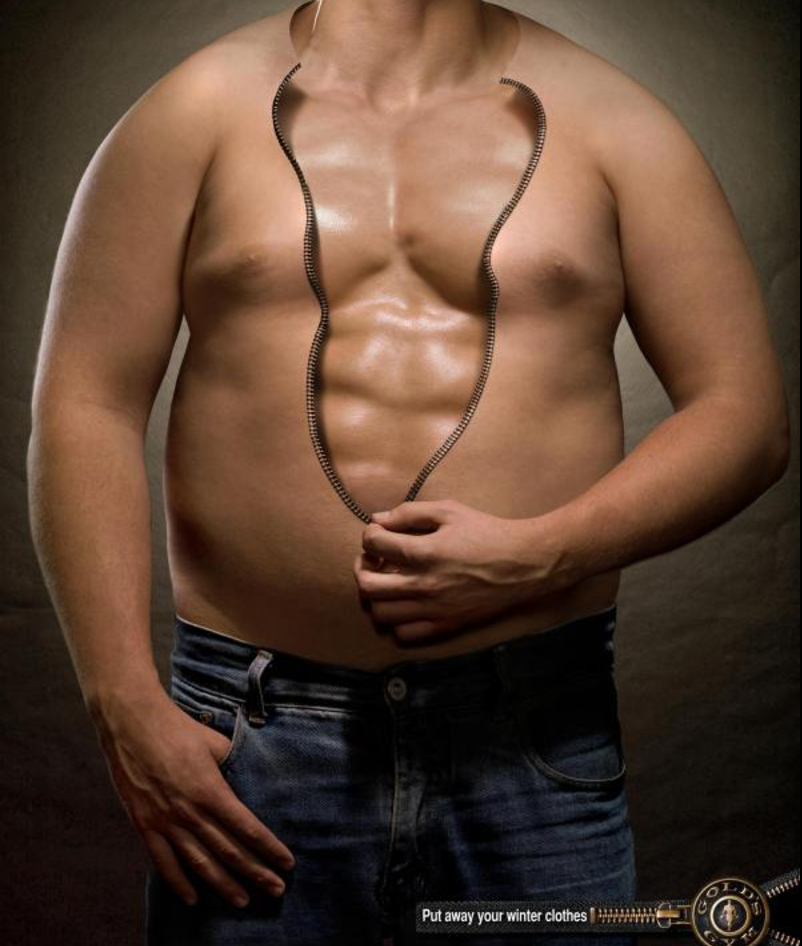These disturbing, shaming advertisements prove that gyms get body positivity all wrong
Ugh.
Even as outspoken activists like Ashley Graham make amazing strides promoting health, wellness, and body positivity, for some reason, gym chains are still falling behind when it comes to getting with the program. Instead of promoting things like health and inclusivity — which, you know, might actually get more people to the gym — chains like Gold’s have come under fire time and again for making their advertising campaigns all about shaming fat people.
Recently, an Imgur user went viral for curating some of the most “brutal” of the body-shaming gym advertisements, with literally all of them shaming food or fat bellies, reminding consumers that only six packs have value.
These ones are great because they insinuate that men with fat bellies are basically pregnant women, feeding off men’s inherent fears of being compared to women in any sort of way.
Reminder: you can only eat if you are also thin. No ifs, ands, or buts.
What is even happening, here.
This same company made an ad of a baby elephant following a woman instead of its actual mother, so that’s great.
According to Gold’s, there is only one type of body that’s acceptable.
And that is “shredded, of course.”
You get the picture.
“Go to the gym if you want to see your penis.”
… Alright, you get the picture.
Before you @ us saying we’re “glorifying obesity,” know that we’re absolutely not saying that going to the gym is bad. In fact, we love exercise, and are huge proponents of finding ways to incorporate some sort of physical activity into daily life. Whether that’s running or walking outdoors, yoga class in the park, dancing in the living room, or rocking some plank jacks and deadlifts at the gym, we are totally on board as long as your doctor is, too.
The problem is advertisements like this — ones promoting body-shaming, exclusive environments — have been known to have exactly the opposite effect of what they’re intending. In a study released last July, the University College London found that people who experience discrimination or negative interactions based on their weight tend to gain weight, with the study’s lead author, Sarah Jackson, revealing in a statement that “people who experience discrimination report comfort eating.”
“Weight discrimination has also been shown to make people feel less confident about taking part in physical activity, so they tend to avoid it,” she continued.
So, yeah — trying to make an overweight person get to the gym by running ads making them feel like garbage about their pot belly isn’t going to make them buy sessions with one of your trainers, brah. Instead, it’s going to make them stay home, because would you want to enter a challenging new environment if everything you know about said environment is that the people there aim to judge and shame you?
The good news is, slowly but surely, people seem to be learning. After yet another Gold’s advertisement gone wrong went viral last summer — another one with a pear, this time with the phrase “This is no shape for a girl” making things somehow even more horrifying — the gym apologized and shut down the campaign, which is something that never, ever would have happened even five years ago.
A photo posted by Abigail Breslin (@abbienormal9) on Aug 15, 2016 at 5:46pm PDT
(Tell ’em, Abigail.)
But still, as incidents like Dani Mathers shaming an older naked woman at an L.A. Fitness remind us time and again, gyms really need to think long and hard about how they want to advertise to America’s overweight population — and of course, about whether or not their brand promotes toxic behavior like Mathers’.
Since it’s already been proven that what they’ve been doing since the dawn of time has the exact opposite result as what they’re intending, it would be wonderful — and likely economically fruitful, too — for gyms to embrace the body positivity movement and hire, say, a plus-size athlete like Women’s Running magazine did in 2015. They’d quickly find out how much better things go when you actually decide to make those you are marketing to feel included.


